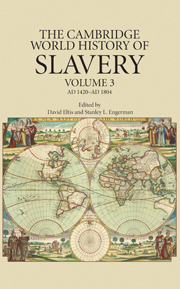Book contents
- Frontmatter
- Contents
- List of Maps, Figures, and Tables
- Contributors
- Series Editors' Introduction
- 1 Dependence, Servility, and Coerced Labor in Time and Space
- PART I SLAVERY IN AFRICA AND ASIA MINOR
- PART II SLAVERY IN ASIA
- PART III SLAVERY AMONG THE INDIGENOUS AMERICANS
- PART IV SLAVERY AND SERFDOM IN EASTERN EUROPE
- PART V SLAVERY IN THE AMERICAS
- PART VI CULTURAL AND DEMOGRAPHIC PATTERNS IN THE AMERICAS
- PART VII LEGAL STRUCTURES, ECONOMICS, AND THE MOVEMENT OF COERCED PEOPLES IN THE ATLANTIC WORLD
- 22 Involuntary Migration in the Early Modern World, 1500–1800
- 23 Slavery, Freedom, and the Law in the Atlantic World, 1420–1807
- 24 European Forced Labor in the Early Modern Era
- 25 Transatlantic Slavery and Economic Development in the Atlantic World: West Africa, 1450–1850
- PART VIII SLAVERY AND RESISTANCE
- Index
- References
23 - Slavery, Freedom, and the Law in the Atlantic World, 1420–1807
from PART VII - LEGAL STRUCTURES, ECONOMICS, AND THE MOVEMENT OF COERCED PEOPLES IN THE ATLANTIC WORLD
Published online by Cambridge University Press: 28 September 2011
- Frontmatter
- Contents
- List of Maps, Figures, and Tables
- Contributors
- Series Editors' Introduction
- 1 Dependence, Servility, and Coerced Labor in Time and Space
- PART I SLAVERY IN AFRICA AND ASIA MINOR
- PART II SLAVERY IN ASIA
- PART III SLAVERY AMONG THE INDIGENOUS AMERICANS
- PART IV SLAVERY AND SERFDOM IN EASTERN EUROPE
- PART V SLAVERY IN THE AMERICAS
- PART VI CULTURAL AND DEMOGRAPHIC PATTERNS IN THE AMERICAS
- PART VII LEGAL STRUCTURES, ECONOMICS, AND THE MOVEMENT OF COERCED PEOPLES IN THE ATLANTIC WORLD
- 22 Involuntary Migration in the Early Modern World, 1500–1800
- 23 Slavery, Freedom, and the Law in the Atlantic World, 1420–1807
- 24 European Forced Labor in the Early Modern Era
- 25 Transatlantic Slavery and Economic Development in the Atlantic World: West Africa, 1450–1850
- PART VIII SLAVERY AND RESISTANCE
- Index
- References
Summary
To trace the development of slavery and its legal manifestations over the early modern period is to tap some of the larger transformations of the Atlantic world as a whole. In the fifteenth century, slaves constituted a small but recognizable segment of most African, European, and American societies. Some societies with strong imperial traditions (Roman, Islamic, Itza, and Aztec) contained many references to slaves in their commercial, marital, inheritance, civil, and criminal law. Others, with no written traditions or living in relative isolation, developed customs surrounding the intersection of military captivity, labor obligations, and kinship ties that define slavery and free status, which they enforced communally. As European maritime activity transformed the Atlantic Ocean from barrier to facilitator of conquest, migration, and commerce over subsequent centuries, slavery became central, or at least implicitly related, to nearly every society on all three continents. The new plantation complex, with its insatiable demand for laborers, generated new legal systems to enforce compliance. As American colonists became increasingly impatient with metropolitan (European) political control toward the end of the eighteenth century, antislavery discourse fueled much of the political rhetoric of the Revolutionary era, ushering in the republicanism, nationalism, and the constitutional framework of the modern period.
In this chapter, I have sought to put the slave's experience at the center of the story. It is important to see law as a product of social relations, reproduced by successive generations of historical actors.
- Type
- Chapter
- Information
- The Cambridge World History of Slavery , pp. 594 - 630Publisher: Cambridge University PressPrint publication year: 2011
References
- 6
- Cited by

